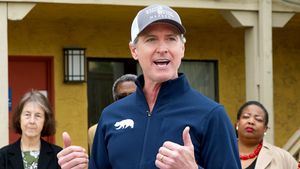Treatment GuideJust DiagnosedSex & DatingAfrican AmericanStigmaAsk the HIV DocPrEP En EspañolNewsVoicesPrint IssueVideoOut 100
CONTACTCAREER OPPORTUNITIESADVERTISE WITH USPRIVACY POLICYPRIVACY PREFERENCESTERMS OF USELEGAL NOTICE
© 2025 Pride Publishing Inc.
All Rights reserved
All Rights reserved
Scroll To Top
By continuing to use our site, you agree to our Privacy Policy and Terms of Use.
For many HIV-positive women, preventing transmission of the virus to their infants isn't as simple as following a step-by-step plan. For them, HIV exists within a cross section of any number of life stressors, including substance abuse, mental illness, coinfection with hepatitis C, homelessness, poverty, and domestic abuse. These women's pregnancies are often far from planned, and their ability to prepare for a healthy birth may be seriously hampered by a life that seems out of their control. Situations like these are where medical centers like St. Vincent's Comprehensive HIV Center in New York City and other social-service agencies around the country work to provide a helping hand. 'The majority of women'once they become pregnant'do everything they can to prevent transmitting HIV to their baby,' says Antonio Urbina, MD, who is medical director of HIV education and training at St. Vincent's as well as a contributing editor to HIV Plus and a member of the President's Advisory Council on HIV/AIDS. 'It's really those who have mental illness or substance abuse where you really get into difficulties, because then addiction kind of overrules that maternal instinct.' But Urbina, who says St. Vincent's treats 10 to 20 HIV pregnancies a year, most of them unplanned, points out that he hasn't seen a seropositive birth since 2004. That's because of the team approach used to help these women. Urbina arranges monthly interdisciplinary meetings among the hospital staff to discuss all the current HIV cases. There, the social workers, obstetricians, and nurses discuss with him how to work in tandem to help pregnant women who have trouble helping themselves. 'The goal of managing an HIV-positive woman is really to treat her virus effectively,' Urbina says, 'and you do that by providing competent HIV care, but then also by managing psychosocial aspects that may prevent them from adhering to their regimens.' Evelyn Harrington, a social worker at St. Vincent's, is known as Mama or sometimes Grandma among the women she helps guide through pregnancy, providing them with a sense of family when outside sources of community may be lacking. 'The first thing anyone wants is to be accepted for who they are,' she says of her leave-judgment-at-the-door approach to care. During a pregnancy, she helps the women establish goals and sets them up with parenting classes. 'I've seen women who've been substance abusers'who've been incarcerated because of drug use and sale'completely turn their lives around,' Harrington says of the life-changing effects of pregnancy. Sometimes, 'they're in college, and they're looking forward to graduation.' Harrington even accompanies the women into delivery for support whenever family isn't available. Russelle Miller-Hill, who is herself an HIV-positive mother of a teenage boy, works as a reproductive health worker at the Albert Einstein College of Medicine in New York and is part of a team that provides a wide array of services to pregnant HIVers. One element of her program that helps women keep their infants healthy is there is no discharge from the program after delivery. In fact, many mothers keep coming back, she says, well after they've given birth. In addition to support groups, individual counseling, and accompaniment to prenatal visits, Miller-Hill's team members help out with baby clothes, furniture, and disposable diapers, and they throw a yearly shower for all the moms. 'We try to make the pregnancy a great event so that it doesn't become a hindrance,' she says. 'It actually is a happy time in their life. For some women, they've never experienced the joy of a baby shower.'
From our Sponsors
Most Popular
Lexi Love comes out as HIV+ after Trump deletes federal resources
January 23 2025 11:23 AM
Grindr is reminding us why jockstraps are so sexy and iconic
May 02 2025 5:36 PM
BREAKING NEWS: Trump admin moves to end federal HIV prevention programs
March 18 2025 6:10 PM
Trump's orders prompt CDC to erase HIV resources
January 31 2025 5:29 PM
Celebrating Black History Month with our annual African American issue
February 01 2025 3:28 PM
Tyler TerMeer vows to continue to fight for health care for all
January 28 2025 3:00 PM
Discover the power of Wellness in your life
March 26 2025 12:41 PM
Plus: Featured Video
Latest Stories
Dancer. Healer. Survivor. DéShaun Armbrister is all of the above
July 02 2025 8:23 PM
Two right-wing Supreme Court justices signal they may uphold access to PrEP and more
April 21 2025 4:10 PM
Broadway's best raise over $1 million for LGBTQ+ and HIV causes
April 03 2025 7:15 PM
Plus nominated for 2025 GLAAD Media Award
January 22 2025 12:42 PM
'RuPaul's Drag Race' star Trinity K Bonet quietly comes out trans
December 15 2024 6:27 PM
AIDS Memorial Quilt displayed at White House for the first time
December 02 2024 1:21 PM
BREAKING: Supreme Court rules to save free access to preventive care, including PrEP
June 27 2025 10:32 AM
1985: the year the AIDS crisis finally broke through the silence
June 26 2025 11:24 AM
Trump admin guts $258 million in funding for HIV vaccine research
June 03 2025 3:47 PM
500,000 Children at Risk: PEPFAR Funding Crisis
April 08 2025 3:51 PM
The Talk Season 5 premieres this spring with HIV guidance for the newly diagnosed
March 26 2025 1:00 PM
Jess King is here to help you live your happiest, healthiest life yet
March 24 2025 4:35 PM
A camp for HIV-positive kids is for sale. Here's why its founder is celebrating
January 02 2025 12:21 PM
VIDEO: A man living with HIV discusses his journey to fatherhood
June 10 2025 4:58 PM
HRC holds 'die-in' to protest Trump health care cuts
April 28 2025 2:11 PM
Season 4 of The Switch on resilience & radical self-love returns this spring
March 26 2025 12:20 PM
Gerald Garth is keeping people of color happy and healthy through trying times
March 11 2025 3:38 PM
This long-term HIV survivor says testosterone therapy helped save his life.
December 16 2024 8:00 PM
Ricky Martin delivers showstopping performance for 2024 World AIDS Day
December 05 2024 12:08 PM













































































